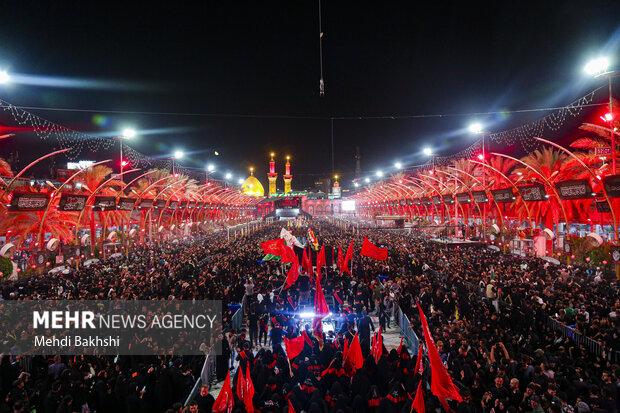
This year’s Arbaeen pilgrimage hit the record with the participation of 25 million people. In a report, the Iraqi government presented some details regarding its efforts in holding the event and serving the pilgrims.
On January 5, 2023, the permanent Ziyarat (pilgrimage) committee was formed at the Iraqi prime minister’s office. The mission of the committee was to study and make suggestions for the formation of the infrastructures and preparation of a comprehensive plan to organize the Arbaeen pilgrimage and serve the pilgrims as well as possible.
Headed by the Iraqi interior minister, the Arbaeen pilgrimage committee, the temporary committee, and security committees were established. Headed by the prime minister’s office, delegations were also formed to provide different services. This committee was in charge of making coordination with the authorities of neighboring countries, as well as providing the necessary services and coordinating with all relevant authorities.
Military and security forces were also in charge of ensuring the security of routes and provinces, especially in the west of Karbala and Najaf.
Some of the other steps taken to prepare for the Arbaeen procession are as follows;
Roads and routes:
– Inauguration of a new road (Baghdad – Jurf Sakhar- Karbala) with a length of 80 km (completed and inaugurated on September 13, 2011).
– Opening of Highway No. 1 to Karbala from Babil province.
– Opening a side road on the road from Baghdad to Samarra and creating 14 settlements for pilgrims.
– Installation of pontoon bridges, the opening of new roads, and development of some old routes in the provinces of Maysan, Wasit, Al Diwaniyah, Najaf, Baghdad, Musayib, and Karbala.
– Repairing the roads leading to the borders (Zurbatiyah, Al-Shaib, Al Mandhariyah) to Karbala (some repairs have been done and some have not yet been completed).
Border crossings:
– Solving the problems of the Khosravi and Chazabeh crossings, which the governorates were in charge of.
– Ordering to create and build special complexes for accommodation and catering at border terminals.
– Ordering to increase the number of computers at the borders in order to facilitate the commute, as well as the construction of new roofs for the crossings’ halls, and asphalting the routes and areas around the border crossings.
– In order to speed up the time of visa issuance, an electronic mechanism was set at the borders for exchanging information between the Iranian and Iraqi sides.
Transportations:
– 1,200 modern buses on the road of Karbala-Najaf
– 1057 buses and government-belonged vehicles in the Karbala-Babil route
– 700 buses for providing services on the Karbala-Baghdad route
– 250 buses in the Al-Husseiniya area
– Hundreds of other buses were in service in different areas provided by the Iraqi Kurdistan region, the Iraqi Army, the PMU, and other governmental organizations.
– Operation of 23 Iranian trains and 420 Iranian buses
– Several vehicles were also prepared to provide service inside and near the city of Karbala
– 839 trucks
– Water tankers
– 1,500 ambulances out of the total (of 2,800)
– Also, hundreds of types of heavy vehicles were prepared for logistical assistance to supply and clean the pilgrimage areas.
– 4 main squares were prepared for the gathering of buses and pilgrims near Karbala.
– Regarding air transport, the Iraqi PM ordered to carry out aerial field operations to facilitate providing services to pilgrims at Baghdad, Basrah, and Najaf airports.
Public services:
1. Water and Ice:
– Using ice factories in different provinces even in Iran and the region.
– Opening and maintaining the largest crystal ice production factory as well as another water production factory on Baghdad Airport Street.
– Buying half a million ice cubes from Iran and renting refrigerators.
– Purchasing water to meet the needs of pilgrims in large amounts.
– Providing hundreds of water tanks from the governorates
2. Fuel:
– Providing gas and Kerosene for mawkibs and ice factories at a cheap price.
– Providing fuel to the workforce participating in the transportation section at a cheaper price.
– Establishment of mobile fuel stations.
– Providing free fuel for vehicles of supporting governorates.
– Supplying fuel to power plants in emergency situations.
3. Financial services:
– The financial credit needed and allocated for religious pilgrimages was given to the relevant centers.
– Distribution of 50 billion dinars for visits between the relevant governorates and Al-Atabat Al-Aliyat (additional amount to the budget)
– Some amounts from the emergency budget were allocated for this visit (the last one was 6 billion for buying ice and renting a bus, and before that, an amount for the construction of the new Baghdad-Karbala road).
4. Command and control system:
– The formation of an operation room with the presence of the Prime Minister, which included all relevant security and service authorities and governorates to follow up on the management live and use the powers granted directly to the Prime Minister.
– The formation of an operation room for the management of the transportation situation in Karbala.
– The formation of an operation room for managing the situation of providing services in Karbala.
Other taken measures:
– An electricity plan was developed to solve the shortage and maneuver between the governorates. Hundreds of power transformers were also connected to the Mawkibs on the road of Karbala and Najaf.
– A plan was developed to manage water resources and raise the water level in some rivers, and a maneuver was carried out to transfer water from Tigris to Euphrates.
– The health ministry deployed mobile hospitals and ambulances on the processions’ routes.
This year, according to the number of pilgrims and the hot weather in Iraq, all the efforts of the Iraqi officials from the highest rank to the local employees were in line with holding this ceremony better.
The cooperation of the Iraqi people and the lovers of Ahl al-Bayt contributed to holding the ceremony more gloriously.
MP/5881599